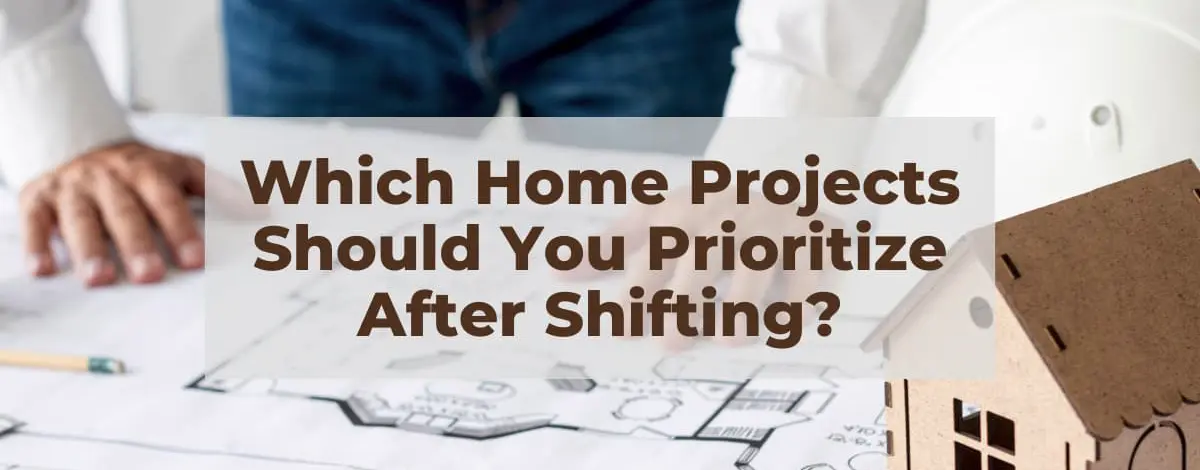Buying your first house is exciting, but after the initial rush wears off, and you’re left with a stack of unopened boxes and an ever-expanding to-do list, it can be difficult to determine what to do immediately.
Changing your address and calling the utility companies may make it seem as if every other task is as important.
No need to worry; we’ll let you know which tasks you should complete right away to begin turning your house into a home and which ones may wait until later.
Prior to moving in:-
There are a few tasks that are best finished as soon as you get the keys to your new house. While some of these initiatives are mandated for safety reasons, it’s also important to consider ease. Some tasks are simpler to complete prior to the arrival of shifting items and furniture.
Prior to you moving into your new home, the following tasks should be at the top of your list:
Repaint Some Color:-
You’ll probably desire to repaint the new house to suit your tastes, as you have unique color choices. Although you may do this at any time, it is unquestionably simpler to complete if there isn’t any furniture or shifting things in the way.
When you opt to color your walls yourself, be aware that there are several guidelines to follow to speed up the entire procedure.
You can choose to employ a nearby interior painter to handle this chore for you while you get settled if doing it by yourself seems like an additional unending chore on your to-do list.
When painting isn’t in your immediate plans, you may still prepare by purchasing paint swatch cards from your neighborhood paint shop to see how various hues look in your new house.
When you can paint, you will already know which colors will suit you best after seeing how they look under the daily sun.
Change the flooring:-
In a perfect scenario, if you intend on providing your house with a fresh look, you’d change the flooring prior to settling in, just like painting the exterior of the house.
Wall-to-wall matting in restrooms, for example, should be eliminated even if you are unsure of your long-term goals because this historically common practice encourages mold growth. Cover exposed steps with runners for security.
You can speak with a nearby flooring firm to discuss your alternatives if you’re not sure what kind of flooring belongs where.
It can seem like a mammoth undertaking to install new floors in a new house, but doing it single space at a time can make it feel more manageable.
Insert molding:-
Installing wall, ceiling, floor, door, and window molding is an additional possible task to add style and make your house appear more complete and sophisticated.
If you intend to undertake this task, think about whether you’ll add an enclosure or seat rail molding before entering to save time.
So that you can start working as soon as you obtain the keys, prior to unloading and packing boxes.
Make it Glitter:-
For a spotless new house, employ a cleaning team. Furthermore, ideally, you should take care of things before you really move in.
Since this is a regular service, nearby cleaning companies will be familiar with all the steps involved in cleaning a house for new owners.
However, if you have any unique demands, be sure to mention them. Although you can complete this operation without service, it may be an important task (depending on the state the home was left in) and may consume a significant portion of your moving-in period.
During the first month:-
Eventually, you settle into your new house, and you’ve (mostly) unloaded your boxes. What should you do now that you’ve completed the most critical things on your list? You can complete the following tasks within the first week of getting in, but you should do them soon after moving:
Putting up a Security System:-
Employ a local home security company to set up a safety system in your new house if it doesn’t already have one.
It should ideally have a fire alarm and gas detectors; make sure they are all operational and swap out the power sources when necessary.
These systems can fend off would-be burglars, but most also let you remotely watch over your house while you’re away, adding to your sense of security.
Repair Any Problems Found During Inspection:-
Consider taking care of any immediate problems your house inspector found. Install a radon mitigation system when your new home has radon exposure. If the water in your new house is hard, you may wish to set up a softening system.
If you suspect your new house contains asbestos or mold, be sure to employ a professional to remove it.
You may consider contacting the gas company to have them look at all the home’s pipes and hookups, even if the inspector was supposed to have examined the plumbing. Similar to that, according to the season, think about hiring a local HVAC specialist to service your air conditioner or heater.
Improving the electrical system:-
You might want to hire an electrician to check that all the appropriate plugs have ground fault circuit interrupters (GFCI) while you’re repairing any inspection-related concerns.
Additionally, they ought to make sure the wiring is secure and, if required, add additional outlets.
To make sure you are in compliance with any local codes, you may decide to swap out the home’s circuit breaker box when it is obsolete.
While you are making small interior improvements to your home, ask the electrician to set up any lighting fittings you require.
Call pest management:-
There are very few things that can compare to moving into a new house only to discover that you have a cockroach infestation.
These creatures, whether they are insects, flies, or other pests, may surely ruin your day.
While you may feel inclined to contact a local pest control specialist right away, waiting a week or two to see whether the issue goes away on its own might be worthwhile.
First of all, when the entrances are all open for boxes and furniture to enter, pests might make an additional showing.
It would be prudent to call in professionals when you’re still experiencing a bug issue, a week or two after moving in.
During The Initial Six Months:-
Excitement, trepidation, and even a little stress are just a few of the emotions that moving into a new house can evoke.
There are a few tasks you should think about delaying due to the chaos that moving into a new house entails.
Every home is different, though, so you should prioritize and complete any repairs that can compromise the structural integrity of your property.
Employ a Plumber:-
Although it’s not required, it may be a good idea to hire a plumber to replace your toilets, particularly if they’re corroded, dirty, or outdated.
You can postpone this repair for a few months so that you can take care of additional pressing problems, unless your toilets and other drainage components of your home are not functioning properly.
The plumber can evaluate your systems while you’re there and provide prices for any impending jobs where they might be necessary, like repairing pipes and joining gas lines.
Concentrate on Landscaping:-
There is no denying that landscaping improves the appearance of your new house. According to the type of task you desire, the cost of landscaping your new house can vary substantially, therefore, it’s imperative to put off starting this job until after you’ve moved in.
Think about the features you want to add to your yard—front and back—to make your new home your personal haven.
Large-scale remodeling:-
Large upgrades, like a restroom or kitchen makeover, ought to be lower on your priority list. This offers you the opportunity to consider what you enjoy and hate about your location, as well as what’s essential and how to make it better.
Waiting at least six to a year before really committing to new renovations is a smart rule of thumb; otherwise, you risk investing thousands of dollars on a task that you don’t truly enjoy.
Make home enhancements:-
It’s an excellent idea to find out the age of various components, such as the ceiling, windows, and furnace, as you recently moved into a house that is new to you. Knowing how long you have left on these items is crucial for planning your budget because they have a finite lifespan.
After some time has passed since you moved into your house, you can begin to upgrade the essential elements that require updating.
Take steps to enhance one area of your home at a time if undertaking whole-home enhancements makes you nervous.
Read Also:-
- How To Prepare Your Car For Transport?
- What Inquiries Should I Make About My Neighbors While Moving?
- What Happens If You Don’t Pay Your Moving Company?
- Are Packing And Moving Done On Separate Days?
FAQs for Buying and Settling into a New House:-
Should I Consider Changing The Flooring Before Settling In?
Yes, you should consider changing the flooring before settling in.
Why Should I Install A Security System Soon After Moving In?
After moving in, you should install a security system because it will shield your home in several ways.
When you’re not home, your house can be watched. You can stay safe from burglaries and other problems.
Why Is Installing Molding Suggested Before Moving In?
If you install molding before moving in, you can save time when you open the boxes.
Moreover, your house will get a good appearance when you enter there.
How Important Is Professional Cleaning Before Moving In?
A professional cleaning company knows how to handle the cleaning task properly in your house.
So, before you move in, employing a professional is a good option.


